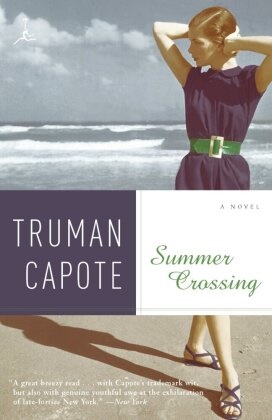Read more
Zusatztext "Truman Capote is the most perfect writer of my generation." -Norman Mailer Informationen zum Autor Truman Capote was born September 30, 1924, in New Orleans. After his parents’ divorce, he was sent to live with relatives in Monroeville, Alabama. It was here he would meet his lifelong friend, the author Harper Lee. Capote rose to international prominence in 1948 with the publication of his debut novel, Other Voices, Other Rooms. Among his celebrated works are Breakfast at Tiffany’s, A Tree of Night, The Grass Harp, Summer Crossing, A Christmas Memory, and In Cold Blood, widely considered one of the greatest books of the twentieth century. Twice awarded the O. Henry Short Story Prize, Capote was also the recipient of a National Institute of Arts and Letters Creative Writing Award and an Edgar Award. He died August 25, 1984, shortly before his sixtieth birthday. Klappentext Thought to be lost for over 50 years, here is the first novel by one of the greatest American writers of the 20th century. Set in New York during the summer of 1945, this is the story of a young carefree socialite, Grady, who must make serious decisions about the romance she is dangerously pursuing and the effect it will have on everyone involved. Fans of Breakfast at Tiffany's and Capote's short stories will be thrilled to read Summer Crossing .Chapter 1 “You are a mystery, my dear,” her mother said, and Grady, gazing across the table through a centerpiece of roses and fern, smiled indulgently: yes, I am a mystery, and it pleased her to think so. But Apple, eight years older, married, far from mysterious, said: “Grady is only foolish; I wish I were going with you. Imagine, Mama, this time next week you’ll be having breakfast in Paris! George keeps promising that we’ll go . . . I don’t know, though.” She paused and looked at her sister. “Grady, why on earth do you want to stay in New York in the dead of summer?” Grady wished they would leave her alone; still this harping, and here now was the very morning the boat sailed: what was there to say beyond what she’d said? After that there was only the truth, and the truth she did not entirely intend to tell. “I’ve never spent a summer here,” she said, escaping their eyes and looking out the window: the dazzle of traffic heightened the June morning quiet of Central Park, and the sun, full of first summer, that dries the green crust of spring, plunged through the trees fronting the Plaza, where they were breakfasting. “I’m perverse; have it your own way.” She realized with a smile it was perhaps a mistake to have said that: her family did come rather near thinking her perverse; and once when she was fourteen she’d had a terrible and quite acute insight: her mother, she saw, loved her without really liking her; she had thought at first that this was because her mother considered her plainer, more obstinate, less playful than Apple, but later, when it was apparent, and painfully so to Apple, that Grady was finer looking by far, then she gave up reasoning about her mother’s viewpoint: the answer of course, and at last she saw this too, was simply that in an inactive sort of way, she’d never, not even as a very small girl, much liked her mother. Yet there was little flamboyancy in either attitude; indeed, the house of their hostility was modestly furnished with affection, which Mrs. McNeil now expressed by closing her daughter’s hand in her own and saying: “We will worry about you, darling. We can’t help that. I don’t know. I don’t know. I’m not sure it’s safe. Seventeen isn’t very old, and you’ve never been really alone before.” Mr. McNeil, who whenever he spoke sounded as though he was bidding in a poker game, but who seldom spoke in any event, partly because his wife did not like to be interrupted and part...
Report
"Truman Capote is the most perfect writer of my generation."
-Norman Mailer

